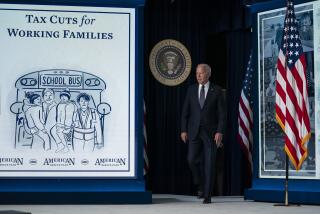Treasury Ready to Start Sending Out Tax Refunds
- Share via
WASHINGTON — The U.S. Treasury is set to begin mailing tax refunds of up to $400 per child to 25 million families later this week -- a cornerstone of President Bush’s effort to juice the economy, but a benefit that has sparked controversy.
Bush will trumpet the imminent arrival of the refunds today, when he and Treasury Secretary John W. Snow visit a Philadelphia office where the checks are being printed.
But Democrats and their allies Wednesday continued their effort to spotlight the 6.5 million low-income families who will not receive the money.
To protest lack of action on a bill to extend the relief to the working poor, the Democrats slowed action in the House for hours by forcing back-to-back roll call votes on routine matters.
“We will continue to be disruptive,” House Minority Leader Nancy Pelosi (D-San Francisco) said.
And in a demonstration organized by the Children’s Defense Fund, a liberal advocacy group, hundreds of young people whose families would not receive checks rallied at the White House and on Capitol Hill.
“We wanted legislators and people in Congress to know the children in our district are being mistreated,” said Jacinta James, 15, of New York.
Some Republicans worry that the dispute could cloud the sunny message Bush wants to send about the prospects for economic improvement. But a push this week by Senate Republicans to resolve the issue was thwarted by GOP leaders in the House. As a result, Congress is heading into its summer recess without any sign that the deadlock will be resolved soon.
At issue is one of the most tangible benefits of the $350-billion package of tax cuts and spending initiatives Bush signed into law in May. Among its provisions was an increase -- from $600 to $1,000 -- in the per-child tax credit for this year, next year and 2005.
Families who qualify do not have to wait until they file their 2003 taxes to receive the benefit because the law instructed the Treasury to mail the payments in advance. The Internal Revenue Service will be sending the checks in three mailings: this Friday, Aug. 1 and Aug. 8.
Republicans anxious about the economy’s continued troubles are hoping that the refund checks will give people a boost -- economically and psychologically.
“Cash in people’s hands makes a big difference,” said Rep. Jack Quinn (R-N.Y.).
However, the tax credit increase did not apply to low-income families who make too little money to owe federal income taxes. Although tax cut bills often authorize payments to low-income people in lieu of tax credits, the measure Bush recently signed did not.
That omission provoked a storm of protest among Democrats and liberal activists, and caused Bush to ask Congress to approve the benefit for low-income families.
The Senate quickly responded by passing a $10-billion bill in June. But House leaders rejected the push to target the legislation solely to low-income families and instead passed a broader, $80-billion tax cut that also would provide more benefits for upper-income taxpayers.
Efforts by House-Senate negotiators to reconcile the measures so far have stalled.
A trio of Senate Republicans this week tried to jump-start the talks by proposing a $50-billion compromise. But the proposal pleased neither side: House Republicans said it did not provide enough tax relief; Senate Democrats said it cost too much.
That essentially killed prospects for action on the issue before Congress returns from its summer break in early September.
And some Republicans backing the benefits for low-income families predict that the proposal now may be doomed. “I’m not encouraged anything will happen,” Rep. Fred Upton (R-Mich.) said.
The impasse reflects in part the different constituencies the two parties are playing to: Democrats are trying to help the lower-income people who tend to vote Democratic; Republicans are skewing benefits to the more affluent voters who tend to vote GOP.
*
Times staff writer Susannah Rosenblatt contributed to this report.
More to Read
Get the L.A. Times Politics newsletter
Deeply reported insights into legislation, politics and policy from Sacramento, Washington and beyond. In your inbox three times per week.
You may occasionally receive promotional content from the Los Angeles Times.











